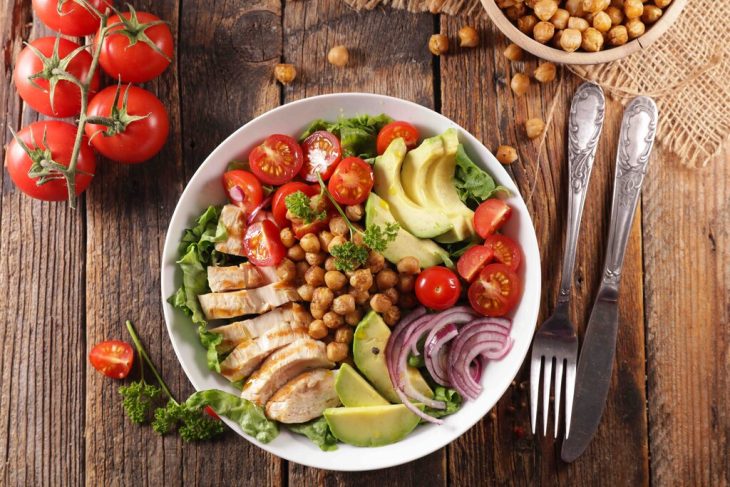
Chicken salad is a classic and versatile dish enjoyed by many. Whether served as a sandwich filling, a refreshing salad, or a wrap, it offers a delightful combination of flavors and textures. Beyond its delicious taste, chicken salad also brings several nutritional benefits to the table. In this article, we delve into 10 chicken salad nutrition facts, shedding light on its calorie content, protein content, vitamins, and more. Let’s uncover the health benefits of this beloved dish.
Calorie Content
The calorie content of chicken salad can vary depending on the specific ingredients and the portion size. On average, a serving of chicken salad with dressing contains approximately 250-350 calories. Choosing lighter dressing options and incorporating plenty of vegetables can help keep the calorie count in check.
Vitamins and Minerals
Chicken salad offers a range of essential vitamins and minerals. Chicken is a good source of B vitamins, including niacin and vitamin B6, which support energy production and brain function. Additionally, vegetables like lettuce, spinach, and tomatoes used in chicken salad provide vitamins A, C, and K, as well as minerals such as potassium and folate.
Healthy Fats
While chicken breast itself is low in fat, the addition of healthy fats can enhance the flavor and nutritional profile of chicken salad. Adding ingredients like avocado, olive oil, or nuts can provide heart-healthy monounsaturated fats, which support brain health, reduce inflammation, and aid in nutrient absorption.
Lean Protein Source
Chicken salad is an excellent source of lean protein. Chicken breast, commonly used in chicken salad recipes, is low in fat and high in protein. This macronutrient is essential for building and repairing tissues, supporting immune function, and promoting satiety.
Fiber Content
Fiber plays a crucial role in digestion and overall gut health. Including fiber-rich vegetables and whole grains in your chicken salad, such as lettuce, broccoli, or quinoa, can increase the fiber content of the dish. This promotes satiety, supports healthy digestion, and may aid in weight management.
Versatility and Customization
Chicken salad is highly versatile, allowing for customization based on personal preferences and dietary needs. Whether you prefer a creamy dressing, a tangy vinaigrette, or a light citrus-based marinade, you can tailor the flavors to suit your taste while maintaining a nutritious meal.
Low Carb Options

For individuals following a low-carb or ketogenic diet, chicken salad can be adapted to fit their nutritional goals. Using lettuce wraps or opting for low-carb vegetables as the base can reduce the overall carbohydrate content while still providing a satisfying and flavorful meal.
Antioxidant-rich Ingredients
Many ingredients commonly found in chicken salad, such as berries, spinach, and nuts, are rich in antioxidants. These compounds help protect cells from damage caused by harmful molecules called free radicals. Including these antioxidant powerhouses in your chicken salad boosts its nutritional value and supports overall health.
Portability and Convenience
Chicken salad is a convenient option for meals on the go. It can be prepared in advance, making it an ideal choice for packed lunches or quick and easy dinners. By planning and preparing your chicken salad ahead of time, you can ensure you have a nutritious meal readily available.
Moderation and Balance
While chicken salad can be a healthy addition to your diet, it’s essential to practice moderation and balance. Pay attention to portion sizes and be mindful of any additional ingredients or dressings that may contribute to calorie and fat intake. Combining chicken salad with a variety of other nutrient-rich foods helps maintain a well-rounded and balanced diet.
Final Word
Now that you’re familiar with these 10 chicken salad nutrition facts, you can enjoy this delicious dish with a deeper understanding of its health benefits. From its lean protein content to its vitamin-packed ingredients, chicken salad offers a nutritious and satisfying option for any meal.
Frequently Asked Questions (FAQs)
Can I make a vegetarian version of chicken salad?
Yes, you can create a vegetarian version of chicken salad by replacing the chicken with plant-based protein sources like tofu, tempeh, or chickpeas. These alternatives provide protein while maintaining the texture and versatility of the dish.
Can I freeze chicken salad?
Yes, you can. While some components of chicken salad, such as the dressing and vegetables, may not freeze well, cooked chicken can be safely frozen. It’s best to assemble the salad fresh and freeze any leftover cooked chicken separately to maintain its quality.
How long can chicken salad be refrigerated?
To ensure food safety, it’s recommended to refrigerate chicken salad within two hours of preparation. Properly stored in an airtight container, chicken salad can typically be refrigerated for up to three to four days.
Are there any gluten-free alternatives for chicken salad?
Yes, there are gluten-free alternatives for chicken salad. Opt for gluten-free bread or wraps if you prefer a sandwich or wrap-style chicken salad. Additionally, gluten-free grains like quinoa or rice can be used as a base for a gluten-free chicken salad bowl.
Can I use leftover roasted or grilled chicken in chicken salad?
Absolutely! Leftover roasted or grilled chicken can be an excellent addition to chicken salad. Simply shred or chop the cooked chicken and incorporate it into your salad for added flavor and convenience.
Was this page helpful?
Our commitment to delivering trustworthy and engaging content is at the heart of what we do. Each fact on our site is contributed by real users like you, bringing a wealth of diverse insights and information. To ensure the highest standards of accuracy and reliability, our dedicated editors meticulously review each submission. This process guarantees that the facts we share are not only fascinating but also credible. Trust in our commitment to quality and authenticity as you explore and learn with us.
